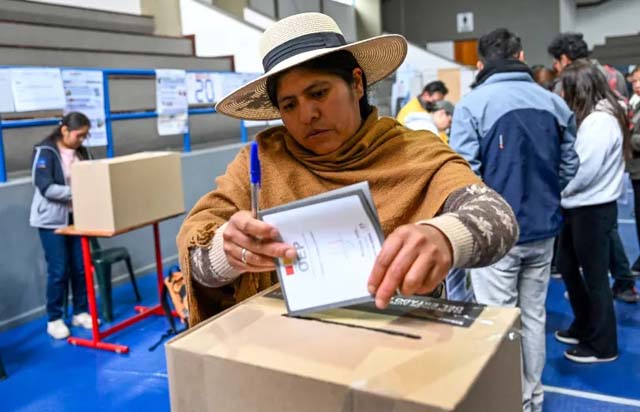News Flash

LA PAZ, Oct 14, 2025 (BSS/AFP) - Bolivia will choose between two rightwing figures in presidential elections Sunday, ending two decades of socialist rule that has left the beleaguered South American nation deep in the red.
With no dollars, no fuel, and annual inflation nearing 25 percent, struggle-weary voters flatly rejected the Movement Toward Socialism (MAS) party founded by former president Evo Morales, in a first electoral round in August.
On Sunday they will elect one of two die-hard MAS opponents in the hopes of change: Senator Rodrigo Paz or former president Jorge Quiroga.
Either way, the country will bring to an end an economic experiment marked by initial prosperity funded by Morales's nationalization of oil and gas, followed by critical shortages of fuel and foreign currency under incumbent Luis Arce.
Bolivia, a lithium-rich country of 11.3 million people, is facing its worst economic crisis in four decades, with long queues a common sight at gas stations or at stores carrying subsidized rice and oil.
"There is desperation; most people live day to day," said Pamela Roque, a trained 29-year-old surgical technician who is considering emigrating due to a lack of jobs.
"Things are not going to go well for us here."
Under Morales, the country's first Indigenous president, Bolivia posted South America's fastest economic growth and slashed poverty and unemployment, as government revenue from nationalized hydrocarbons skyrocketed. It invested heavily in social programs.
But with insufficient investment in the sector, oil production under Morales ally-turned-rival Luis Arce plummeted and Bolivia almost depleted its dollar reserves to sustain a universal fuel subsidy policy.
Arce leaves office on November 8 after serving a single presidential term from 2020. Bolivia's constitution allows for two terms, but Arce did not seek reelection.
- 'Can't have both' -
With 44.9 percent of stated voter intention, 65-year-old Quiroga has a narrow lead over Paz, 58, who enjoys 36.5 percent support, according to a survey by Ipsos-Ciesmori.
A former vice president under Hugo Banzer, Quiroga served a brief stint as president in 2001 and 2002 when the incumbent fell ill.
The winner will face an uphill task, inheriting an economy in recession, according to the World Bank.
"With either of the two, if quick solutions are not provided, the social cost and the risk of protests will be high," political scientist Ana Lucia Velasco told AFP.
Quiroga, a US-trained engineer who leads the center-right Freedom and Democracy (Libre) Alliance, has proposed a $12 billion injection in the economy with international loans, and to bolster foreign investment.
For rival Paz, an economist and the son of former president Jaime Paz Zamora (1989-1993), the solution lies in balancing the budget before taking on more loans.
Bolivia's external debt is almost a third of GDP.
Paz, who leads the Christian Democratic Party, has promised to cut taxes, eliminate import duties and ensure "capitalism for all, not just for a few," while ruling out strict austerity measures.
Both candidates propose maintaining fuel subsidies only for public transportation and vulnerable economic sectors, as well as maintaining social programs and bonuses.
But Velasco argues that "you can't have both things" -- maintaining subsidies while also stabilizing the economy.
"People have their hopes pinned on electoral promises that are very difficult, perhaps impossible, to fulfill," she told AFP.
Bolivian voter Jorge Serrano, a 73-year-old retired builder, said she didn't trust either of the candidates.
"What can they give me? The pension I have is not enough for anything," Serrano said.
Bolivia's old-age pension is just over $100 per month.
- Shadow of Morales -
Paz's Christian Democratic Party has the highest number of lawmakers in parliament, but no majority. Quiroga's alliance is the second-biggest force.
Outside of Congress, both would face stiff opposition from Morales who remains popular, especially among Indigenous voters, but is constitutionally barred from seeking another term.
Morales, who is the target of an arrest warrant for human trafficking over an alleged sexual relationship with a minor -- an accusation he denies -- has vowed mass protests if the right returns to power.
"Together with the people we will take the fight to the streets," he told AFP in August.